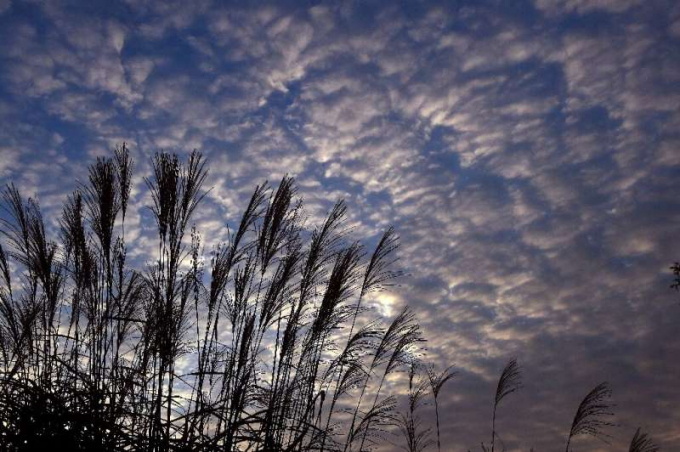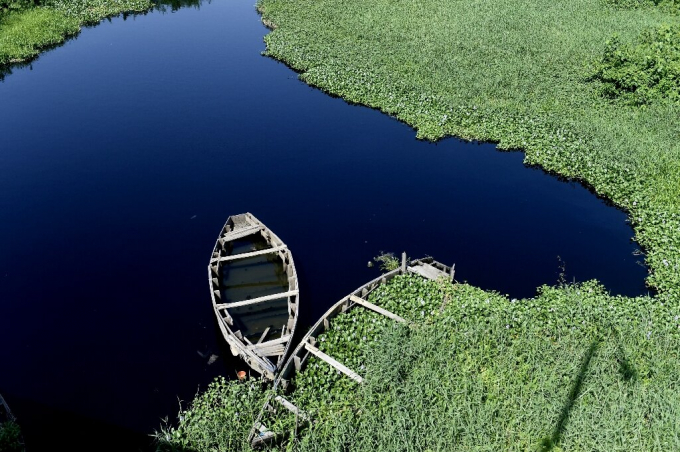November 21, 2025 | 14:44 GMT +7
November 21, 2025 | 14:44 GMT +7
Hotline: 0913.378.918
November 21, 2025 | 14:44 GMT +7
Hotline: 0913.378.918

A garden favourite or an invasive pest?. Photo: Phys.org
But conservationists warn that Cortaderia selloana—or pampas grass—is a damaging invasive species menacing parts of southern Europe.
Also known as "feather duster", pampas grass is sold as an ornamental plant despite appearing in a rogue's gallery of a hundred of the worst invasive species in Europe.
At the world congress of the International Union for the Conservation of Nature (IUCN), winding down this week in Marseille, a motion called for "urgent action" to restrict and ultimately eradicate the plant outside its native South American habitat.
Conservation groups and ministries, many from Spain, said they were "alarmed because today its seeds can be bought easily and cheaply anywhere in the world, without legal constraints, through different internet platforms".
The case highlights the difficulties of halting the spread of invasive plants in the face of low awareness and a massive international online trade offering exotic species at the click of a button.
"You see more clearly the impact of animals—they are a predator destroying a prey. But plants can have a very severe effect," Piero Genovesi, who heads up the IUCN's Invasive Species Specialist Group.
"It's less visible in the beginning, but then it becomes huge."
Genovesi told AFP that in Europe most invasive plants are introduced by being sold for gardens.
"Pampas grass is beautiful, but it spreads very rapidly, so once it's out, it's very difficult to contain it," he said.
The plant is "very aggressive", according to the EU-backed LIFE Stop Cortaderia project, warning that it has expanded across urban and industrial areas and squeezed out native species in Atlantic coastal areas of France, Spain and Portugal.
It featured on a European inventory of a hundred of the worst invasive species—an awareness-raising effort to highlight problem species.
Now the IUCN is going a step further with a new global classification system called the Environmental Impacts Classification of Alien Taxa.
It has scientific criteria to measure the relative threats posed by different harmful species—animals and plants—to help governments prioritise their responses.
The first few have already been added, but the organisation is aiming for hundreds, as a complement to its Red List of Threatened Species.
Imperialism and escape
Experts say invasive species are a key driver of global extinctions—along with habitat loss, overexploitation and climate change.
Consider the case of the water hyacinth.
Taken from its home in the Amazon by European explorers, the water hyacinth dazzled imperial courts, including France's Napoleon and his plant-loving wife Josephine, with its beautiful floating flowers.
They took it to Egypt, where it escaped and began a continent-wide invasion.
"In Africa, it creates huge green carpets, blocking navigation, fishing, access to water, destroying the habitat for many fish and also increasing evaporation so it decreases the water stock," said Genovesi.
"It also creates an environment for mosquitoes and increases the risk of malaria."
Keeping unwanted species out in the first place, he said, is far easier and cheaper than trying to get rid of them once they have put down roots.
Bad seeds
One key concern—for pampas grass and many other species—is that climate change will further increase the range and competitive advantage of invasive species.
Another challenge is the international trade in seeds.

Water hyacinths, seen here in Lagos, have choked waterways across the world. Photo: Phys.org
This issue was highlighted last year in a bizarre incident where US authorities raised the alarm after thousands of Americans reported receiving packets of seeds they had not ordered, mostly from China.
Many of the packages were likely part of a "brushing scam", where a seller sends unwanted items and posts fake reviews, but it prompted Amazon to announce last September that it would ban imported seeds in the United States.
Some invaders, however, are more welcome than others.
"You think of the beautiful landscapes of Tuscany—cyprus, poppy flowers and all the cereals. They're all introduced, none of them are native, but we love them," said Genovesi, adding that authorities needed to focus their energies on fast-spreading and damaging varieties.
Even at the IUCN conference he had spotted an insect greenhouse, which contained an invasive plant as well as exotic butterflies.
"We look at that and say 'let's hope they don't escape'," he said.
(Phys.org)

(VAN) In a new study published in Trends in Biotechnology, researchers used a gene-editing technology called CRISPR to increase a fungus's production efficiency and cut its production-related environmental impact by as much as 61%- all without adding any foreign DNA.

(VAN) A top official in Beijing’s Cop delegation says China is committed to clean energy – but US’s absence is a problem.

(VAN) The Bangsamoro region’s inflation rate rose slightly to –1.3 percent in October 2025 from –1.5 percent in September, the Philippine Statistics Authority (PSA-BARMM) reported.

(VAN) FAO-led report says protecting and restoring forests is crucial to boosting climate-resilient agriculture, rural livelihoods and global food and water security.

(VAN) Flagship partnership secures additional GBP 16.9 million to strengthen forest monitoring, transparency and country support to 2030.

(VAN) After a turbulent year for international development, the aid and assistance landscape has shifted, with donors rethinking how, where and why they support sustainable development.

(VAN) A new tool for measuring the economic value of farm animal welfare improvements has been developed, potentially transforming how consumers, retailers and the government evaluate animal welfare policies.